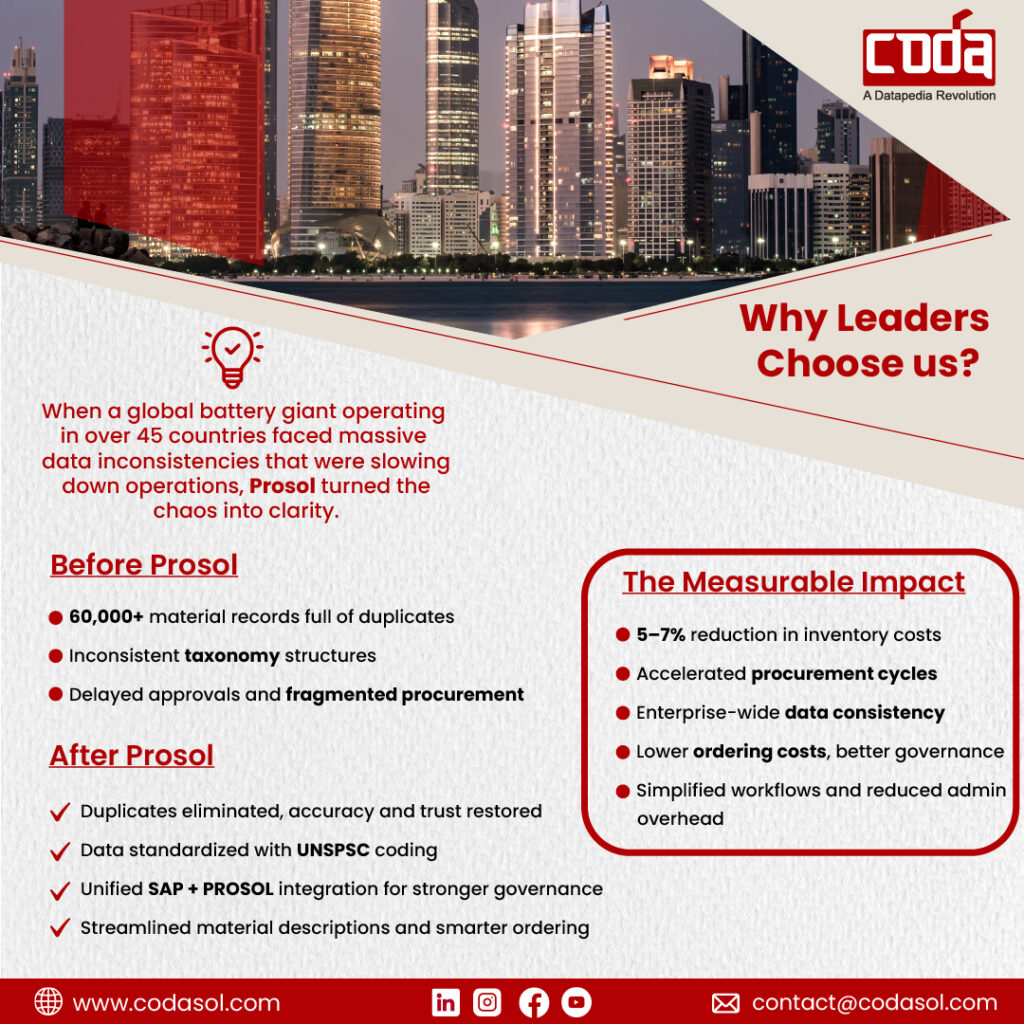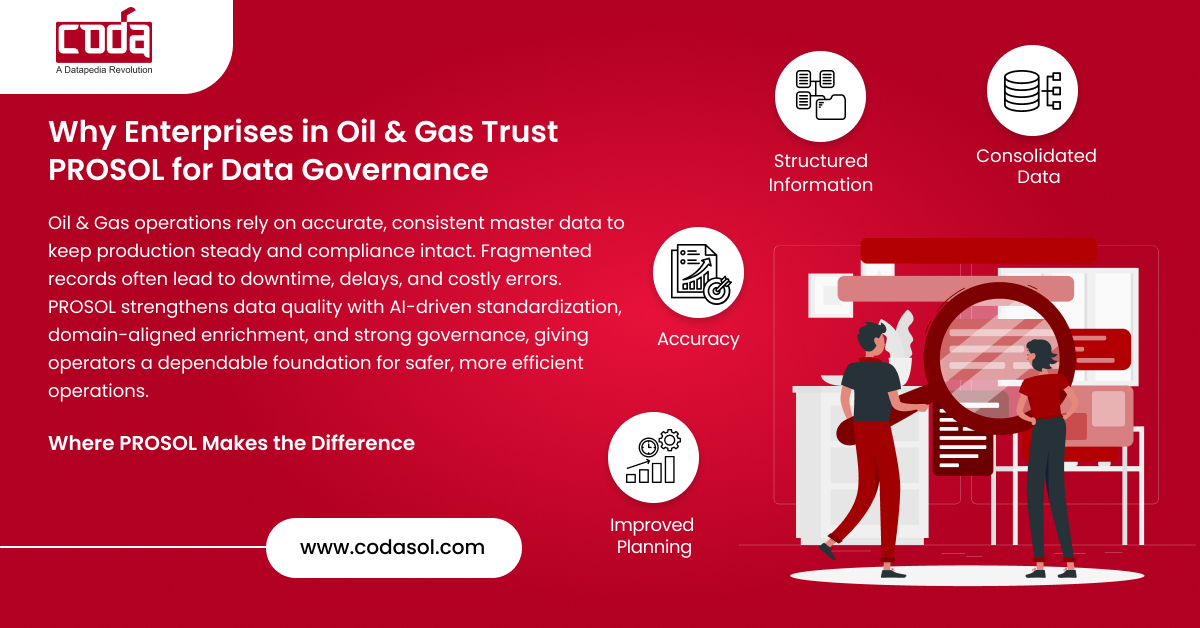Why Enterprises in Oil & Gas Trust PROSOL for Data Governance
In large oil and gas enterprises, scattered or inconsistent master data slows operations and increases costs. Duplicate vendor records, incorrect material descriptions, and missing asset details can cause downtime, procurement delays, and compliance risks. As a result, industry leaders across the Gulf, India, the Far East, and the US are adopting PROSOL for Data Governance Oil & Gas to create a clean, reliable, and standardized data foundation.
Moreover, PROSOL embeds AI-driven intelligence and governance workflows directly into the master data lifecycle. Consequently, enterprises can ensure accuracy, consistency, and audit-ready records across SAP, Oracle, Infor, IBM Maximo, and other operational systems.
Why Strong Data Governance Is Critical for Industrial Operations
Oil and gas companies manage some of the most complex data environments in the world, spanning upstream, midstream, downstream, maintenance, logistics, and procurement. Without strong governance in place, this data quickly becomes inconsistent, duplicated, or unreliable.
Common Pain Points Across the Industry
Data silos across business units
Multiple ERPs and legacy systems store the same information differently, which complicates cross-functional decision-making.
Inconsistent master data standards
Equipment names, material descriptions, and supplier details vary across plants and regions.
Lack of ownership or accountability
When no data owners or stewards are defined, quality declines and uncontrolled changes escalate.
High cost of poor data quality
Duplicate materials, incorrect spare parts, and inaccurate vendor data cause excess spending, rework, and operational delays.
Increasing compliance and ESG pressure
Regulations now demand clear traceability, full auditability, and lifecycle visibility for materials, equipment, and vendors.
Ultimately, these data issues affect operational uptime, inventory accuracy, procurement efficiency, and safety. Therefore, establishing a strong governance foundation is no longer optional and is essential for modern oil and gas operations.
Essential Features for Data Governance Oil & Gas Solutions
Oil and gas companies manage massive volumes of asset, material, and maintenance data across multiple ERPs and operational systems. Because of this complexity, teams need a governance solution that brings clarity, consistency, and full control over every record. With the right approach, operations run smoothly without delays, errors, or costly manual rework.
Unified Data Management for Oil & Gas Governance
Data flows in from SAP, Oracle, Infor, IBM Maximo, and several engineering tools. When those systems don’t speak the same language, inconsistencies creep in and decisions take longer. PROSOL bridges these gaps through smooth ERP integrations, delivering standardized and accurate data across all applications. With everything aligned, teams finally operate from one trusted version of the truth.
Standardizing Master Data
Industrial environments contain thousands of materials, equipment types, and vendor descriptions, each with its own format or naming pattern. To address this, PROSOL cleans, classifies, and structures every record to make it consistent, searchable, and operationally aligned. This means maintenance teams, procurement, and supply chain functions all use data they can trust.
Compliance-Ready Data Governance in Oil & Gas
Frameworks such as ISO 14224 and UNSPSC are essential for global operations. For this reason, PROSOL automatically applies these standards, keeping data compliant, uniform, and fully audit-ready. Additionally, every change is tracked, making regulatory reporting easier and faster.
AI-Driven Data Quality for Oil & Gas Governance
Incorrect or duplicate data often leads to procurement delays and maintenance risks. To prevent these issues, PROSOL uses automated validations, guided workflows, and AI-powered deduplication to ensure only accurate and approved records enter the ERP. Furthermore, continuous monitoring maintains long-term data health.
Scalable Data Governance Oil & Gas Solutions
Large oil and gas enterprises operate across multiple plants, countries, and data-heavy environments. Because of this, they require a governance solution that scales effortlessly, supports high data volumes, and integrates smoothly with all existing systems. PROSOL meets these needs, enabling consistent governance regardless of geography or system complexity.
How PROSOL Delivers Data Governance for Oil & Gas
PROSOL plays a much larger role than cleansing and enrichment. It embeds governance into every step of the master data lifecycle, ensuring consistency and control from creation to approval. Teams get reliable and audit-ready data across all systems.
AI/ML-Driven Cleansing & Enrichment:
Advanced AI models identify duplicates detect duplicates, incorrect classifications, and missing attributes with high accuracy. In addition, the models are trained specifically on oil and gas patterns, which helps deliver cleaner results.
Golden Records that Strengthen Data Governance in Oil & Gas
Instead of scattered or conflicting versions, PROSOL consolidates into one complete and unified record. As a result, users always work with the most accurate version.
Embedded Governance Workflows
Every data update moves through clear steps: submit, validate, review, approve, and sync to ERP. This process reduces ambiguity and strengthens accountability.
Full Data Lineage for Data Governance Oil & Gas Compliance
Complete traceability is built into every field. Moreover, the platform supports regulatory, ESG, and audit reporting by providing complete visibility.
ERP Integration That Powers Data Governance Oil & Gas
Direct integration with SAP ECC/S4HANA, Oracle EBS, IBM Maximo, and Infor EAM. Because of the real-time sync, data stays consistent across all operational systems.
Strong Access Control & Security
Role-based permissions ensure that only authorized users can create, modify, or approve data. Therefore, the platform enforces both security and governance discipline.
In short: PROSOL doesn’t just store data, it transforms it into reliable, operationally ready, and compliant records.

Take control of your enterprise data with PROSOL’s governance workflows.
PROSOL’s Real ROI on Data Governance for Heavy Industries
Strong data governance delivers measurable business outcomes. From cost savings to smoother operations, the impact is both immediate and long-term. With PROSOL, enterprises working in asset-intensive environments see meaningful improvements across uptime, compliance, and inventory accuracy.
Reduced Downtime
Incorrect or duplicate spare parts are a leading cause of unplanned shutdowns. To prevent these issues, PROSOL standardizes material data across plants, enabling faster procurement and fewer maintenance delays. As a result, teams always have the right parts available when they need them most.
Lower Inventory & Procurement Costs
Unified master data helps eliminate duplicate purchases, excess stock, and emergency orders. Many enterprises report a 10–20% reduction in inventory after adopting PROSOL. In addition, procurement teams make more accurate decisions based on reliable, clean data.

Improved Compliance & Audit Readiness
Regulated industries depend on accurate and traceable information. To support these needs, PROSOL maintains standardized naming conventions, complete change histories, and golden records for every entity. Consequently, regulatory reporting, ESG submissions, and vendor risk assessments become much simpler.
Data Foundation for Analytics & AI in Oil & Gas Governance
Reliable master data forms the backbone for predictive maintenance, demand forecasting, spend analytics, and inventory optimization. Without accurate, trusted data, these initiatives cannot deliver meaningful results.
Checklist for Choosing the Right Data Governance Platform
Before finalizing a governance platform, oil & gas leaders focus on several key capabilities:
- A platform that applies unified standards across all sites, bringing consistency to every record.
- The capacity to process large volumes of data effortlessly, even during peak activity.
- Intelligent cleansing features powered by automation to minimize manual correction.
- Native connections to major ERPs, ensuring information moves smoothly between systems.
- Governance routed through clear, role-based approval paths for better control.
- Complete logs that document every update and support compliance reviews.
- Flexibility to expand across materials, assets, vendors, equipment, and documents as operations evolve.
- Dashboards that provide real-time visibility into data quality and ongoing improvements.
PROSOL was built to check all these boxes and more.
Overcoming Governance Challenges with PROSOL
Resistance to New Processes
Even though teams may resist new workflows, PROSOL eases adoption with simple, guided steps that reduce the change load.
Complexity of Industrial Data
Because technical data is hard to classify, PROSOL’s AI models trained on oil & gas patterns deliver more accurate standardization and duplication detection.
Integration with Legacy Systems
Since legacy ERPs are often difficult to connect, PROSOL’s ready-to-use connectors unify SAP, Oracle, Infor, and Maximo into a single governance ecosystem.

See how PROSOL can clean, govern, and unify your enterprise data.
Frequently Asked Questions
1. What is data governance in oil & gas?
It is the framework that ensures your master data is accurate, consistent, and controlled across plants, departments, and systems.
2. Why is MDM important for oil & gas enterprises?
Because poor data quality leads to higher procurement costs, safety risks, downtime, and unreliable decisions.
3. Does PROSOL integrate with SAP, Maximo, Oracle, or Infor?
Yes. PROSOL offers native integration frameworks for all major ERP and EAM platforms.
4. How does PROSOL improve inventory management?
By eliminating duplicates, enforcing standards, and maintaining a single source of truth for materials.
5. What ROI can companies expect from PROSOL?
Organizations typically see savings from reduced downtime, lower inventory, fewer duplicate purchases, and improved operational efficiency.
Ready to Build a Stronger Data Governance Future?

